Elon Musk’s Social Media Platform X Under Scrutiny from EU Over Israel-Hamas War Disinformation Allegations

Addressing Disinformation in the Israel-Gaza Conflict: X’s Response
In recent news, Elon Musk’s social media powerhouse, X, has found itself in the crosshairs of the European Union (EU) over allegations of mishandling disinformation concerning the ongoing Israel-Hamas conflict. The controversy came to the fore after EU Internal Market Commissioner Thierry Breton accused X of permitting the spread of “violent and terrorist content.” This led to a public exchange of words between Breton and Musk on various social media platforms.
X’s Efforts to Combat Disinformation
Elon Musk, the CEO of Tesla and SpaceX, acquired X, formerly known as Twitter, for a staggering $44 billion. Subsequently, Musk streamlined the company, reducing its workforce, including content moderators, in a cost-saving effort, a move that raised significant concerns.
Commissioner Breton, often dubbed the EU’s “digital enforcer,” urged both Musk and Mark Zuckerberg, the head of Meta Group, which encompasses Facebook and Instagram, to provide details on how they were handling “illegal content and disinformation.” He underscored the importance of compliance with the Digital Service Act (DSA), which empowers the EU to levy fines of up to six percent of a platform’s global revenue for failing to combat illegal content.
In response to these allegations, X’s CEO, Linda Yaccarino, penned a letter outlining the platform’s efforts to combat disinformation.
X’s Actions Against Disinformation
Yaccarino’s letter, which she shared on her X account, revealed the concrete steps taken by the platform to counter disinformation. This included the removal of hundreds of accounts associated with the Gaza militant organization, Hamas, since the outbreak of violence. X has also actively worked to eliminate posts featuring “violent speech, manipulated media, and graphic content.”
One noteworthy feature that Yaccarino highlighted is the “community notes” system, which empowers users to correct or provide context to each other’s messages. Impressively, more than 700 notes were added to posts within the first four days of the conflict and garnered tens of millions of views.
Criticism and Challenges
Despite these efforts, Musk’s leadership during the Israel-Gaza conflict has faced criticism, not only from the EU but also from X’s users. Musk faced the need to delete his own post recommending two X accounts as reliable sources for Israel when users pointed out their history of spreading misinformation.
Furthermore, AFP fact-checkers uncovered several posts on X, Facebook, and TikTok promoting a fabricated White House document allocating $8 billion in military aid to Israel. In light of these findings, X was recently rated as the worst major platform for illegal online content by the EU, prompting Musk to withdraw from a voluntary EU code of practice for combating disinformation.
On October 12, Reuters reported that X had removed hundreds of Hamas-affiliated accounts and had taken action to remove or label tens of thousands of pieces of content following the Hamas attack.
X’s Response to EU Ultimatum
These actions came in response to Thierry Breton’s issuance of a 24-hour ultimatum to Elon Musk, demanding that X address the spread of disinformation in accordance with new EU online content regulations. The Digital Services Act (DSA) necessitates that major online platforms promptly remove illegal content and take measures to mitigate risks to public security and civic discourse.
Yaccarino conveyed that X had reallocated resources and refocused internal teams to adapt to the evolving situation, though without specifying the exact nature of these changes. She noted the establishment of a leadership group by the Musk-owned company to assess the situation in the aftermath of the attack.
Willingness to Collaborate
In closing, Yaccarino expressed X’s willingness to engage further with Commissioner Breton and his team to address specific queries and sought further information to which X could respond. She also pointed out that X had responded to more than 80 takedown requests from the EU within the required timeframe and had not received any notices from Europol concerning illegal content on the platform, as detailed in the letter.
On the same day, Commissioner Breton also issued a similar warning to Meta, giving the company 24 hours to report the measures taken to combat disinformation on its platforms in light of the Israel attack.
In conclusion, Elon Musk’s X, despite the recent challenges, appears committed to addressing the issue of disinformation related to the Israel-Hamas conflict, and it remains to be seen how the EU will respond to their proactive efforts.
- Why Every Business Needs a Website in 2026
- Netflix Rom-Com Based on Bestselling Novel
- General Hospital Fans Want Drew’s Storyline to End After Shooter Reveal
- The Odyssey’s Matt Damon Reveals How Much Weight He Lost for Odysseus
- Trump withdraws US from dozens of international and UN entities
- Taylor Swift Reveals Elizabeth Taylor’s Estate’s Reaction to The Life of a Showgirl Song